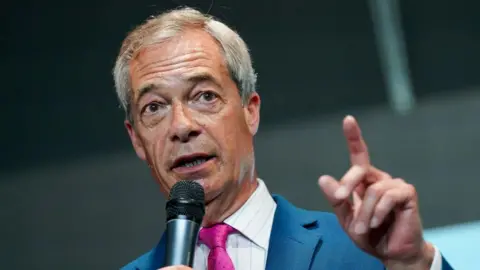By Becky Morton, Political reporter

 Getty Images
Getty Images
Reform UK leader Nigel Farage has said his party is set for a “huge” general election result.
He pointed to the first two results in north-east England, where Reform easily beat the Conservatives to come second, winning almost 30% of the vote.
Reform, which was formed in 2018 as the Brexit Party, is forecast to win 13 MPs, according to an exit poll for the BBC, ITV and Sky.
This is more than many polls during the campaign had predicted.
However, the figure is highly uncertain, as the model suggests there are many places where the party only has a relatively low chance of winning.
Polling expert Sir John Curtice said Reform had benefited from a significant fall in the Conservative vote in seats the party had previously held, as well as advancing most in areas where people voted Leave in the 2016 referendum.
In an early sign of Reform’s success in winning over former Tory voters, the first two results of the night – in Blyth and Ashington and in Houghton and Sunderland South – saw the party beat the Conservatives by more than 4,000 votes.
The third result of the night, in Sunderland Central, followed a similar pattern, with the Reform candidate more than 5,000 votes ahead of his Tory opponent.
Reacting to the results, Mr Farage posted on social media: “The revolt against the establishment is under way.”
In a video he said the first two results from north-east England were “more than any possible prediction or projection”.
“It’s almost unbelievable,” he said.
“It means we’re going to win seats, many, many seats I think right now across the country…
“This is going to be six million votes-plus. This folks, is huge.”
Among Reform’s top targets is Clacton in Essex, where Mr Farage is hoping to overturn a Conservative majority of 24,702.
The exit poll suggests a 99%-plus likelihood that Mr Farage will gain the seat.
Meanwhile, Lee Anderson, who became Reform’s first MP when he defected from the Conservatives in March, is also seeking to hold on to his Ashfield seat in Nottinghamshire.
Dr David Bull, the party’s co-deputy leader, told BBC Radio 4 if the exit poll was right “this is an historic breakthrough”.
He suggested so-called “shy Reformers” could be behind the party gaining more seats than expected, with some people unwilling to tell pollsters they were planning to vote for the party.
He added: “It is the beginning of a revolt. It is the beginning of the people saying we don’t like what’s going on in Westminster.”


Mr Farage has said he is aiming for Reform to become the main opposition to Labour by the time of the next election.
His surprise announcement that he was standing in the election, after previously saying he would not, saw a jump in Reform’s poll ratings.
At the same time he took over from Richard Tice as Reform’s leader and he has played a prominent role in the party’s campaign.
The former UKIP and Brexit Party leader has stood unsuccessfully to be an MP seven times, most recently in South Thanet, Kent, in the 2015 general election, when he finished second behind the Tory candidate.
Clacton was the first constituency to elect a UKIP MP in 2014, after former Tory MP Douglas Carswell defected to the party and triggered a by-election, which he won.
He was unseated by Conservative Giles Watling in 2017, who is fighting to retain the seat.
More than 70% of voters in the Essex constituency supported leaving the European Union in the 2016 referendum.
In 2019 Reform’s previous incarnation, the Brexit Party, stood aside in more than 300 seats previously won by the Tories, amid concerns it could split the pro-Brexit vote.
However, this time the party contested 630 seats across England, Scotland and Wales.
Fielding an almost full slate of candidates in Great Britain posed challenges for the party.
Reform has had to disown six of them over offensive comments since nominations closed.
The party has blamed the surprise announcement of a July election, as well as claiming a company it hired to conduct background checks on would-be candidates failed to carry out vetting before the election was called.
Two Reform candidates also defected to the Conservatives over what they said was a failure of the party’s leadership to tackle the issue.
However, it was too late to remove any of these candidates so they still appeared for the party on ballot papers.




